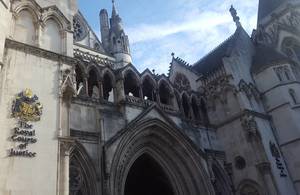Attorney General refers the sentences of PC Andrew Harper’s killers to the Court of Appeal
The Attorney General has sent the sentences of Henry Long, Albert Bowers and Jessie Cole to the Court of Appeal as she thinks they are too low.

The Attorney General, Rt Hon Suella Braverman QC MP, has referred the sentences of Henry Long, Albert Bowers and Jessie Cole to the Court of Appeal under the Unduly Lenient Sentence (ULS) scheme.
The offenders were convicted of the manslaughter of PC Harper and were sentenced at the Old Bailey on 31 July. PC Harper suffered fatal injuries when his ankles got caught in a strap trailing behind a vehicle driven by Henry Long on 15 August 2019.
Henry Long, 19, was sentenced to 16 years’ imprisonment. Albert Bowers and Jessie Cole, both 18, were sentenced to 13 years’ imprisonment.
Speaking about the case, the Attorney General said:
“This was a horrific crime which resulted in the death of a much-respected police officer while he was on-duty, protecting his community.
“Having personally considered the details of this shocking case, I have decided to refer the sentences of PC Andrew Harper’s killers to the Court of Appeal.
“Attacks made against emergency workers will not be tolerated and offenders should be punished with the greatest severity for such heinous crimes.”
A date for the hearing at the Court of Appeal is yet to be set.
ENDS
Notes to editors
-
The ULS scheme allows victims of crime, their families, prosecutors and the public to ask the Law Officers to review sentences for certain crimes that fall within the scheme that they believe are too low.
-
The ULS scheme only applies to sentences given in the Crown Court in England and Wales.
-
The Attorney General can only ask the Court of Appeal to review a sentence under the Unduly Lenient Sentencing (ULS) scheme if she considers that sentence to be unduly lenient. That means, for example, that the sentencing judge made a gross error or imposed a sentence outside the range of reasonable sentences available.
-
The Attorney General acts independently of government when deciding on Unduly Lenient Sentences, also known as acting as ‘guardian of the public interest’.